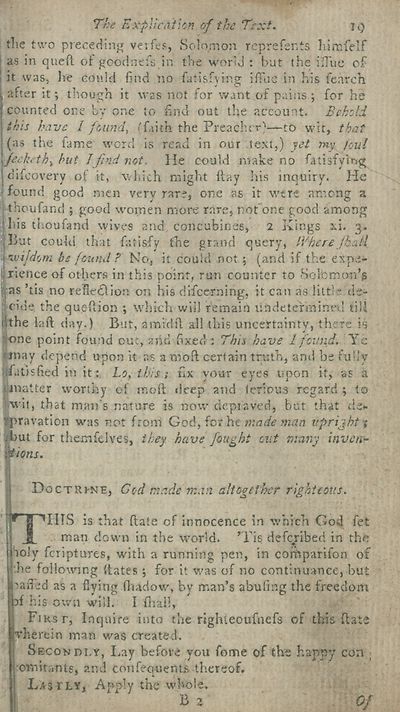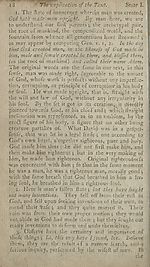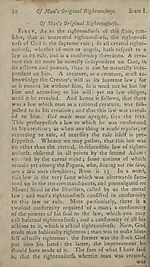Download files
Complete book:
Individual page:
Thumbnail gallery: Grid view | List view

The Explication of the Text. j q
die two preceding verfes, Solomon reprefsnts liimfelf
as in quefl. ot good at fs in the world : hut the ilTue of
it was, lie could find no fatisfying iffue in his fearch
after it; though it was not for want of pains ; for he
counted one by one to find out the account. Behold
this have l found, i faith the Preacher'—to wit, that
(as the tame word is read in our text,) yet nsy foul
feckcthi hut I find not. He could make no fatisfying
difeovery of it, which might ftay his inquiry. He
found good men very rare, one as it were among a
i thoufand ; good women more rare, not one good among
Ids thoufand wives and concubines, 2 Kings xi. 3.
■|But could that fatisfy the grand query, WhereJhutl
«iL'iJdom be found? No, it could not ; (and if the expe-
; nence of others in this point, run counter to 'Solomon’s
|as ’tis no refieOion on his difeerning, it can as little de¬
cade the queftion ; which will remain undetermined till
lithe la ft day.) But, amidft all this uncertainty, there is
rone point found ouc, and fixed : This have l found. Ye
iimay depend upon it ns a moft certain truth, and be fully
Satisfied in it: La, this; fix your eyes upon it, as a
matter worthy of moft deep and lerlous regard ; to
;\vit, that man s nature is now depiaved, but that dep¬
ravation was not from God, for he made man tiprijht-;
ut for themfelves, they have fought out many invent¬
ions.
Doctrj-ne, God made man altogether righteous.
'PT^HIS is that ftate of innocence in which God fet
- _8_ man down in the world. ’Tis deferibed in the
jlioly feriptures, with a running pen, in conftparifon of
ll-he following (fates ; for it was of no continuance, but
rafted as a flying ftiadow, by man’s abufing the freedom
af his own will. I flrall,
First, Inquire into the righteoufnefs cf this ftate
Therein man was created.
Secondly, Lay before you fome of the happy con
omitants, and confeciuents thereof.
Lastly, Apply the whole.
B 2
Of
die two preceding verfes, Solomon reprefsnts liimfelf
as in quefl. ot good at fs in the world : hut the ilTue of
it was, lie could find no fatisfying iffue in his fearch
after it; though it was not for want of pains ; for he
counted one by one to find out the account. Behold
this have l found, i faith the Preacher'—to wit, that
(as the tame word is read in our text,) yet nsy foul
feckcthi hut I find not. He could make no fatisfying
difeovery of it, which might ftay his inquiry. He
found good men very rare, one as it were among a
i thoufand ; good women more rare, not one good among
Ids thoufand wives and concubines, 2 Kings xi. 3.
■|But could that fatisfy the grand query, WhereJhutl
«iL'iJdom be found? No, it could not ; (and if the expe-
; nence of others in this point, run counter to 'Solomon’s
|as ’tis no refieOion on his difeerning, it can as little de¬
cade the queftion ; which will remain undetermined till
lithe la ft day.) But, amidft all this uncertainty, there is
rone point found ouc, and fixed : This have l found. Ye
iimay depend upon it ns a moft certain truth, and be fully
Satisfied in it: La, this; fix your eyes upon it, as a
matter worthy of moft deep and lerlous regard ; to
;\vit, that man s nature is now depiaved, but that dep¬
ravation was not from God, for he made man tiprijht-;
ut for themfelves, they have fought out many invent¬
ions.
Doctrj-ne, God made man altogether righteous.
'PT^HIS is that ftate of innocence in which God fet
- _8_ man down in the world. ’Tis deferibed in the
jlioly feriptures, with a running pen, in conftparifon of
ll-he following (fates ; for it was of no continuance, but
rafted as a flying ftiadow, by man’s abufing the freedom
af his own will. I flrall,
First, Inquire into the righteoufnefs cf this ftate
Therein man was created.
Secondly, Lay before you fome of the happy con
omitants, and confeciuents thereof.
Lastly, Apply the whole.
B 2
Of
Set display mode to:
![]() Universal Viewer |
Universal Viewer | ![]() Mirador |
Large image | Transcription
Mirador |
Large image | Transcription
| Antiquarian books of Scotland > Religion & morality > Human nature in its fourfold state > (23) |
|---|
| Permanent URL | https://digital.nls.uk/107541422 |
|---|
| Description | Thousands of printed books from the Antiquarian Books of Scotland collection which dates from 1641 to the 1980s. The collection consists of 14,800 books which were published in Scotland or have a Scottish connection, e.g. through the author, printer or owner. Subjects covered include sport, education, diseases, adventure, occupations, Jacobites, politics and religion. Among the 29 languages represented are English, Gaelic, Italian, French, Russian and Swedish. |
|---|

